interview by Michael McCarthy
photographs by Joshua Bernard except where noted
There’s something about Lowell, Massachusetts that makes record stores stick like peanut butter on bread. In fact, two of the three record shops that I frequented when I was a kid are still there, RRR Records and Garnick’s Records. And it’s vinyl sales that keep them alive. (To the best of my knowledge, that’s literally the only music format they sell nowadays.) To that end, it’s there in Lowell that a former Lowell Sun newspaper reporter by the name of Dave Perry opened a new vinyl shop a few years ago that’s quickly becoming famous, Vinyl Destination, located in Mill No. 5. It might be a newer shop but I’ve no doubt that it will be around for however long Dave wishes for it to be. It’s just a really fantastic stop that has everything from modern artists like Belle and Sebastian and Adele to classics like The Zombies and Merle Haggard. It’s also a store where you can find shoppers from their early teens to late eighties, maybe younger and possibly older. These days, everyone loves vinyl, and I dare to say everyone in the greater Lowell area loves Vinyl Destination. So, naturally, I had to interview Dave for Love is Pop, since Vinyl Destination is one of my all-time favorite record shops and would be even if it wasn’t local.
MM: Were you born in the Lowell area?
DP: No. I was a Navy brat. I was born in California. And being a Navy brat means you move all over and you move frequently. I started in California. From there we went to Florida then Hawaii then Washington State then California in the San Diego area and then Texas. And that was all by sixth grade. I moved to Connecticut in seventh grade and we ended up staying there until I graduated from high school. So, that was good. That was some stability. And then I moved a few more times. I got here in ’86 and the reason I moved here was that I took a job as a music writer slash features writer for The Lowell Sun.
MM: Did you write for any publications prior to The Sun?
DP: Briefly. There was a thing down in Connecticut when I was living down there. I was working for a weekly paper and it was called Vox Pop and it was a giveaway. I used to use it to get into great shows. I interviewed The dB’s once. One of my favorite ones was I spent an afternoon with D. Boon from Minutemen before they played in New Haven one time. It didn’t pay, but, man, did it pay dividends. The experiences.
MM: That’s why I do Love is Pop, basically.
DP: Right. Exactly. Right? It’s tremendous.
MM: While you were writing for The Sun, were you writing for them exclusively then?
DP: Yes. I was a staff writer full-time. My main duty was to them. I did have a couple of freelance things. I did a thing for Modern Drummer. Let’s see. What else. I don’t know. Just a few things here and there. Things like Yankee. I did a thing for Yankee on Max Roach. So, there would be freelance things that would pop up but my day to day job was with The Sun.
MM: How much per week did you have to write? How many articles?
DP: There wasn’t a minimum at that point. It depended on – like if there was a show that I had to cover I would usually advance it by doing an interview with the artist, especially if they were coming to Lowell, and then I would cover the show. In the meantime, I’m also writing feature stories. For the lifestyle section or whatever it was called. I can’t even tell you. I never really thought about it, I guess. I guess I didn’t have to.
MM: So, how many years did you write for The Sun?
DP: Almost 25. I was there from ’86 to 2010. So, it was close.
MM: Did you do anything else between then and when you started the record store?
DP: Oh, yeah. And it’s what I’m still doing. I have a full-time job writing at UMass Lowell. I write for university relations, which means I do stuff for the alumni magazine and I do news items that happen at the university. It’s a really busy place, so there’s a lot going on there. And I also taught journalism at Middlesex Community College for a couple years, too.
MM: Getting into the music stuff, do you remember who some of the artists were who you liked listening to as a kid, prior to when you started buying music yourself?
DP: Sure. Let’s see. That’s a good one. You know, I loved hearing stuff on the radio and I’d hear it one or two times and it would really stick with me. It’s weird. It’s not stuff that I would cite now as my favorite stuff but it made huge impressions on me like I can remember vividly in California one time driving with my Dad and for some reason I remember The Everly Brothers song called “Bowling Green.” I have no idea why that sticks with me. I remember The Who doing “Happy Jack.” Stuff that was really kind of unique. Big, big impression. And then I started buying records at about ’68. I was about twelve.
MM: What was the first one you bought with your own money?
DP: Oh, boy. I believe the first record I ever bought with my own money was twenty records. It was a stack of things at a flea market. And it was all tied together with string. It was like The Stones, The Animals, The Beatles, a whole bunch of stuff. And I think it was ten bucks.
MM: Sweet.
DP: It was all used stuff, but it was great. I mean, it was kind of an instant record collection right there.
MM: Once you started buying records, how frequently did you buy them?
DP: Oh, God, that’s like trying to describe an avalanche. I started out with 45s mainly after that because I listened to AM radio, living in Connecticut at the time. I listened to AM and everything was a single. It was a 45. There was the chart and all this stuff. So, I would buy two or three 45s a week. And the occasional album. But when I really, really started was in high school. I would buy at least two or three albums a week. I belonged to the Columbia Record Club. And all this other stuff. But the worst was when I was in college. I was living in San Francisco – like I said, I bounced around a lot – but there’s a place called The Used Record Store and that’s where all the critics would turn in their promos. And this being like ’79, ’80, I could get some incredible records for almost nothing. So, I did. I was using food money and everything else.
MM: Yeah. That’s how I was.
DP: Right. It’s a disease, man. You know. Not a bad one, but it’s a disease.
MM: What about when 8 tracks were all the rage? Did you get into those at all?
DP: Well, it’s funny, I can’t say I really enjoyed them, but we did have an 8 track player in my dad’s car. So, I am guilty of listening to things that would pause and have a huge click in the middle of the song. That was always an interesting experience. But, yeah, I did listen to them. Not a big fan though. I’m not a big tape fan at all.
MM: I remember when I was a kid, my parents were the ones buying music until I was old enough and I would listen to my mother’s Barry Manilow 8 tracks and things like that and always from the very beginning – I think from the first time I listened to one – I was like why the hell did it stop in the middle of the song? I can’t believe people actually spent their money on something like that.
DP: A friend of mine used to be the guy who would decide where the edit would go in 8 tracks. He had a little leeway and he would figure out exactly where in the song it would click. That was a real job. How do you do that? It’s like two clicks on “In-A-Gadda-Da-Vida” alone.
MM: How long were you buying records to sell at your store before it actually opened?
DP: OK, here’s what I did. I got this set amount of money. Basically, I took four thousand dollars. When I decided I was gonna do this I walked through the space up here [in Mill No. 5] and my wife and I loved it. Nothing was done yet. We were the first ones to open up here. So, there weren’t even walls. But we walked through. And I said, you know what, I had this money that I could use. Four thousand dollars. I had all of the construction done on all the shelves. I went out and bought crates to put the records in. And I went out and spent thousands on records, too. How many? I don’t know. I could tell you how much money I spent. It came out to just about $3800. For everything until I opened. I was very lucky to just have that, that I could do that with.
MM: How long did it take before it started selling enough that it was paying for itself?
DP: Um, let’s see. I’m trying to think because it’s hard to figure. Probably a year. There was that investment I initially had, taxes you pay, there’s all this overhead and stuff. It takes a while to just get used to the whole thing. Being a business. So, that was a big part of it.
MM: Sure. Sure. Plus, when you first opened there must have been very little foot traffic in the building.
DP: Well, when we first opened, there was no elevator you could use. You had to walk up four flights of stairs.
MM: Oh, God.
DP: I nearly killed a couple of old people, who were coming to shop for records. Not my fault. But, yeah, that took out a lot of traffic right there. And then more businesses came in. They had planned to do the elevator but they finally got it done. It took a while. Once the theatre opened and the yoga studio and the cafe, it made a huge difference. There was foot traffic up here for other things, too.
MM: I would think that a lot of the business you must get is from word of mouth. Because it’s not like there’s a big sign out there saying record store.
DP: No. And this has been an interesting thing. I mean, we’re very social media centric. So, we try to do a lot of it that way. That’s the way they really want to do it up here. They’re smarter than me, but I do hear a lot from people who say, I’ve been in Lowell for a long time and I didn’t know you were here. In some ways, that’s kind of what they want people to do. Let’s put it this way – I have people every week discovering my store. So, that’s nice. But, no, there’s not a huge sign. I think it’s probably hard to do a sign here, too, because there’s a lot of laws about historic districts. I’m not really sure. I’m glad I don’t have to do it though.
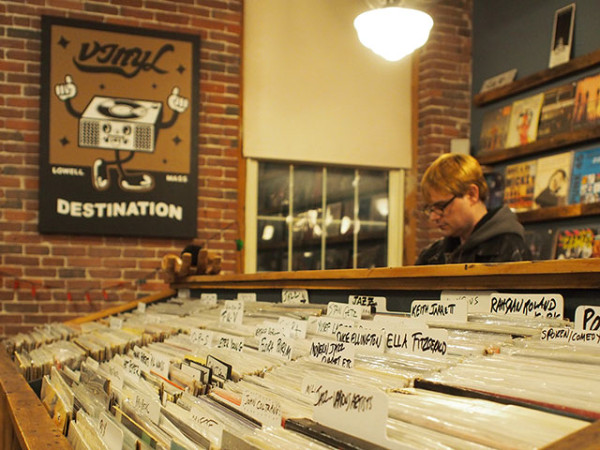
MM: You were initially in one spot and then you moved into the bigger one where you’re now located. How long were you in the smaller spot before you moved into the larger one?
DP: Probably a year and three quarters or so. We were in the small space and it got to be too ridiculous. Plus, I’d always had my eye on this space because there’d never really been anything in it. They used it for events and things. I finally just made the jump. They were nice enough to let me. So, that’s been huge. That’s been great for us.
MM: Do you think you’ll ever outgrow that spot?
DP: To be honest with you, it’s weird, Mike, but I do have kind of a weird fear of that. Because I can’t stop buying stuff. It’s crazy but my wife will tell you all day long that Dave has a problem. And she’s right. [Both laugh]
MM: I’ve got the same one.
DP: Exactly! Exactly. That’s what I’m talking about.
MM: Oh, yeah. When CDs were all the rage I would buy probably ten CDs a week. That’s what I would spend all my money on.
DP: Yeah, I know. It’s crazy. But when you’re a reviewer, you get them sent to your house, too. I was getting all kinds of stuff. Things just showing up in the mail. You have to find a place for it.
MM: So, when you started out reviewing, were they sending out promo vinyls?
DP: Yeah. Yup, they were.
MM: Now they don’t even send the CDs. They just send you download links.
DP: Is that true?
MM: Yup.
DP: There’s no physical product left.
MM: Nope. Not for critics.
DP: Geez. That’s wild. That’s wrong. Well, I guess I got out at a good time. I don’t know.
MM: Was the name Vinyl Destination your idea?
DP: No. It was my idea to have a contest. So, I just threw it out there on Facebook and said, you know, we’re doing a store. If you were gonna do a record store, what would you call it? It was great. There were just all kinds of great names that came up. And Dan Phelps, who is a columnist over at The Sun, who I worked with for years and years, came up with Vinyl Destination. And as soon as I saw that, I was like, that’s it. Game over.
MM: Do you sell records exclusively at your shop or do you do record fairs or anything like that?
DP: I do a fair every now and then. Not much. No. That’s how I got my initial experience, selling records, at shows and stuff. If you remember Big Ed’s or Big Phil’s in Chelmsford, that was one of the ones I helped organize. So, that was really fun.
MM: I used to love those because they had all kinds of bootleg concerts and stuff like that.
DP: I think you can still find those from some people. They’re still out there at some shows. It’s weird. I was in New York last year, the FMU record show, and there were guys selling bootleg copies of vinyl. Of stuff that was on the charts, which was weird. I guess you can bootleg anything, I don’t know.
MM: A guy that I just interviewed is a big Nick Drake fan and he ordered this album Pink Moon – it’s worth 800 dollars and he saw somebody selling it for $500 on eBay. So, he bought it from him and it turned out to be a bootleg.
DP: Oh, man, are you kidding me?
MM: The guy let him return it. And you know how he found out it was a bootleg? It was pressed on that 180 gram vinyl, which they didn’t use back then.
DP: No, that’s right.
MM: So, that’s how he knew.
DP: Oh, man, that’s funny.
MM: The bootlegger put it on a higher quality record and that’s how he shot himself in the foot.
DP: It’s weird. That’s another reason I love record stores is I’m not a fan of buying online. I’ve never bought anything online and I’ve never sold anything online yet. I may do some of that with sealed things but I don’t want to get into this – all I’ve heard is nightmares about quarrels with buyers and sellers and I don’t need that.
MM: That’s how I feel. I used to be a movie critic, too, and I have all these movie press kits and some of them are worth a hundred bucks, but I haven’t tried to sell any myself. I’ve got a friend who sells stuff on eBay all the time but it seems like once a month he’s bent out of shape because someone didn’t get something they were supposed to have received. It just seems like a big headache.
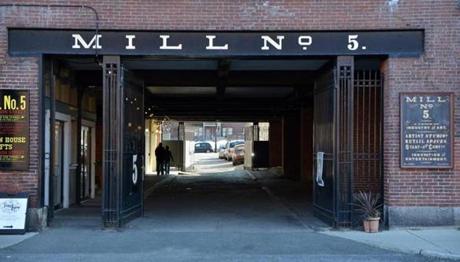
DP: And there’s always a big thing about it. They go into arbitration or something. I don’t know. It’s just, God, I don’t want to deal with that.
MM: I know that guy who owns RRR records downtown sells a lot of stuff online.
DP: Yeah, he does. Ron does. He’s the one who’s trying to talk me into doing some of my stuff online. It makes a lot of sense. He’s great. He’s really one of my favorite people in town. He does exactly what he wants with his record store and that’s what makes it beautiful.
MM: Yeah. He’s always been that way. Do you remember when he was in that tiny spot?
DP: Oh, yeah. Over on Paige Street.
MM: Yeah, over by the bus stop.
DP: Yeah. You’d go in sometimes during the day and it would be full of bus fumes. I remember that well.
MM: He was always doing his own thing.
DP: Absolutely.
MM: I think he actually had a little label and put out some of those G.G. Allin Records and stuff.
DP: He still does put out some noise stuff. He’s known, kind of appropriately, as the Godfather of Noise. He’s an amazing, amazing guy.
MM: Vinyl has been making quite a comeback during recent years. Would you ever have guessed that this would happen?
DP: Well, yeah, I was kind of watching it happen. If you were doing record shows, you would notice it before people started keeping track of it. When you really noticed it – what I really loved – was you started seeing more young women showing up to it. That told me so much about what was going on. And it continues that way. I’m telling you, you go to the New York show in May and you will see a huge percentage of women. It used to be this crazy room full of male nerds now there’s female nerds, too. That was a good sign. You’d see prices go up from other sellers. And you’d notice little things that happened. And it just kept being more and more little things. It turned into something that was kind of a trend.
MM: What percentage would you say it’s gone up over the last three years?
DP: The past three years? Oh, God. I just – I have no idea. I’ve looked at the numbers and there were some pretty astounding numbers coming out. Somebody had said over a certain amount of time 900%. Because they weren’t even making a lot of records, you remember. Ten years ago.
MM: Now they’re opening new plants to meet the demand.
DP: Yeah, Yeah. It’s true. It’s unreal. So, I don’t know. All I know is there’s more people coming in and they’re of all ages and they’re of all tastes. So, what more could you ask for?
MM: Even Urban Outfitters is selling vinyl now.
DP: Barnes & Noble now has these little kiosks type things. Vinyl records. Barnes and Noble is not alone. [Editor’s note: Barnes & Noble in Nashua now has a huge row of vinyl in the actual music and movies section of the store, this in addition to the kiosks.] Urban Outfitters has been selling them for a while. If you’re crafty, and you can go find where all the sale stuff is, you can find some cheap records, too. So, that could be good.
MM: I tend to prefer Newbury Comics for the new stuff.
DP: Yeah. Yeah. That’s a good place for that. There’s Bull Moose, Newbury – those are good stores for that stuff.
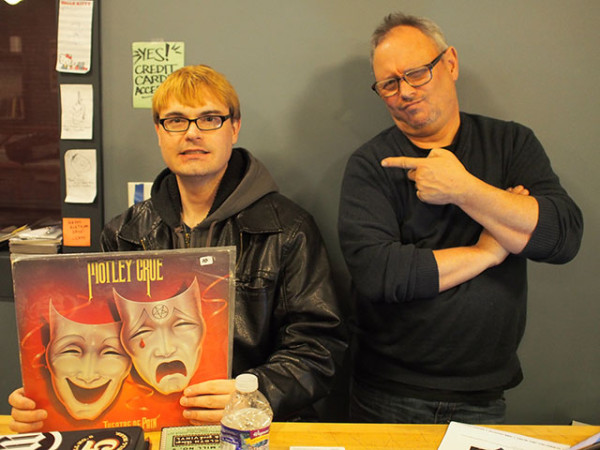
MM: Have you thought about selling new vinyl? Like new releases?
DP: I do sell new vinyl.
MM: You do now?
DP: Yeah. I sell – let’s see. I have the new Adele record. I have a whole bunch of stuff. I’ve had it for a while. It just depends on what you can get at the time. When you say new, I mean sealed, too. Stuff that is a reissue but it’s sealed and it’s a really good, quality record. There’s a lot of that stuff. I just got in a pretty large order today. I have all the Bowie reissues and all that. So, I have been doing that. And that’s been good. I would never be completist with that though. I’ll never have, oh, here’s all the new Pearl Jam records. It’s just not kind of what I do.
MM: Yeah. That’s understandable. What do you think about them pressing stuff on this 180 gram audiophile vinyl?
DP: Well, I think it’s just heavier, that’s all. I mean, I’m not sure the vinyl is any better. I’m sure they’re using the same masters, so all it is, is heavier. It’s funny. It’s really funny. Every time people start getting into something for the music, they love a format, and record labels find a way to do something almost just incomprehensible. People buy it for a while. I have literally had people tell me they buy 180 gram vinyl and they don’t sound as good as the original pressings, which I believe.
MM: The thing I don’t like is when records first started coming back I started buying them right away and you could get a new album for like $16.99 and there’s some artists I got into at the time that have now put out their third or fourth album and now they put it on 180 gram and they want $40 for one album.
DP: Yeah, I don’t get that. I mean, I don’t know. I don’t know what to tell you. It seems ridiculous. As long as the music sounds good, that’s all I really care about.
MM: I think because CD sales are pretty much dead –
DP: – They’re trying to make it up.
MM: Now I’ve heard that cassette tapes are making a comeback.
DP: Yup. I’ve had more people ask. Which, when I say more, it’s not a lot but I’ve had more inquiries about it in recent times. That’s a format I never liked because, I don’t know, tape stretches, how do you find the beginning of a song? It’s kind of a weird format to me. It’s just something I never really got into. I still have tapes I had when I was a kid. Like Rascals tapes and stuff.
MM: You never bought tapes to listen to in the car?
DP: Yeah, exactly. Exactly. The formats change in terms of what’s portable. That was the only option for a while.
MM: I was just bummed that mini-discs didn’t take off. I loved mini-discs.
DP: I never really knew much about them.
MM: Well, the thing was, they were like mini CDs but you could re-record on them up to a million times. And you could move the tracks around and divide tracks. I would make these compilations where I’d rip a 20 minute news cast and then chop it up and edit it and put bits in between songs, things like that. There were a lot of cool things like that you could do.
DP: Oh, yeah. Absolutely.
MM: I definitely prefer vinyl though.
DP: Yeah.
MM: Now say someone comes into your store and asks you to recommend something. What are your go-to records?
DP: Well, it depends. I ask them a little bit about themselves first. What do they like? What do they listen to? I had a girl who came in around Christmas. It was her sister’s gift. This girl comes in and asks all the time and she said, “Do you have any Nirvana?” I said, no, I don’t at the moment. I just sold out of the new thing they have. I said, you know – I think a little bit about, it’s not that it sounds like Nirvana but what rather has the same energy or something, and I thought of the band Wavves. And she loved it. Huge hit. Her sister loved it and she was very happy. And that’s, God, I’m so happy when that happens.

MM: Have you seen the movies High Fidelity or Empire Records?
DP: Absolutely.
MM: And what do you think of the way they portrayed record stores?
DP: [Laughs] I think High Fidelity is a riot. It was hysterical. The thing is, for that script, they obviously used characters that we all sort of knew. There’s Jack Black, the guy who won’t sell you the record that you really want and that kind of stuff. It’s funny stuff. I never really took that too seriously. So, I didn’t think of it one way or another, but one of the things they do show about it was that you can help people learn stuff about music and you can be kind of a taste-maker, in a sense, if you want to be. I’m not much of that, but that could all work out. I mean, they clearly did that in that movie.
MM: Now I just have a few semi-random questions. The first one is, have you ever bought music downloads?
DP: No. I never have.
MM: Never?
DP: No, I know, and it’s weird. Download cards come with records now and when I get them I usually just give them away. If you know me at all, and you’re a friend of mine, you know what a complete technophobe I can be. That was just like, there’s one more thing I don’t want to get into. Because I had thousands and thousands of records and CDs at home. Why would I need that. I could take CDs [for portable use]. I don’t have to walk around all the time with stuff going in my head.
MM: It’s an obsession though. I know people who download so much you wouldn’t believe me.
DP: No, because I know people who do and I do believe it. The thing is, a lot of people grew up with downloads and it’s an incredible thing to think that they wouldn’t use them. I have a son who turns 30 soon, and another one who’s twenty seven, who’s my business partner here. And basically, those guys know that whole world, but Dan, I think likes records better. Just for the reason most people do now. Because there’s a thing there. There’s a physical product. Something with art on it and liner notes and all that.
MM: And it’s like a ritual when you play one.
DP: Yeah, sure, of course. Of course it is. You have to go through a set of actions to earn listening to it, I guess.
MM: When CDs were coming out and were said to have the best sound and everything, did you get into CDs at all?
DP: Yeah. Well, I had to, too. I was reviewing them. It was very easy to review CDs comparatively. You could take them with you and play in the car. They’re very easy to deal with at home. They were very simple. And I thought, wow, this is the greatest thing ever. This is so cool. And then it faded really fast for me. I’m not quite sure why, but it just did. But I kept with them, you know, for a time.
MM: There are some albums I like so much I buy on vinyl and CD, probably one a month.
DP: Give me an example.
MM: Adele. I have her albums on vinyl and CD. Duran Duran.
DP: Well, OK. For me, something like that would be Pink Floyd. I have Darkside of the Moon on vinyl but I also would get the 30th anniversary version or something. When there’s something markedly different about it, I can appreciate that. There were a lot of times when I would get stuff on CDs that I had on vinyl. I have to admit that. Just not anymore. What’s funny is, at the beginning there was stuff you couldn’t get on CD that was on vinyl. Now, there’s some stuff [on CD that you can’t get on vinyl] – There’s this great tribute to The Byrds that came out of England. I don’t know if it ever came out on vinyl or ever will. But I’m not getting rid of my CD of it.
MM: Final question: who are your favorite artists?
DP: Well, I will give you a little list. Beatles. Stones. REM. Minutemen. Springsteen. Dylan. Sonic Youth. God, let’s see. Who else?
MM: What about female artists?
DP: Big Joni Mitchell fan. Huge Neko Case fan. Neko Case is somebody that I think is still getting better all the time.
MM: Yeah, I like her.
DP: Really good. I love The Cramps. That’s a mix that’s got male/female. Great trash rock. The dB’s, that’s a band from North Carolina and New York. They’re just unbelievably good and terribly under-appreciated. Jazz? John Coltrane. I mean, there’s just a million different things. Miles Davis. A guy named Marion Brown. There’s so many amazing people.
Special thanks to Dave for doing this interview!
Be sure to like Vinyl Destination on Facebook and visit the actual store in Mill No. 5 in downtown Lowell, Massachusetts!

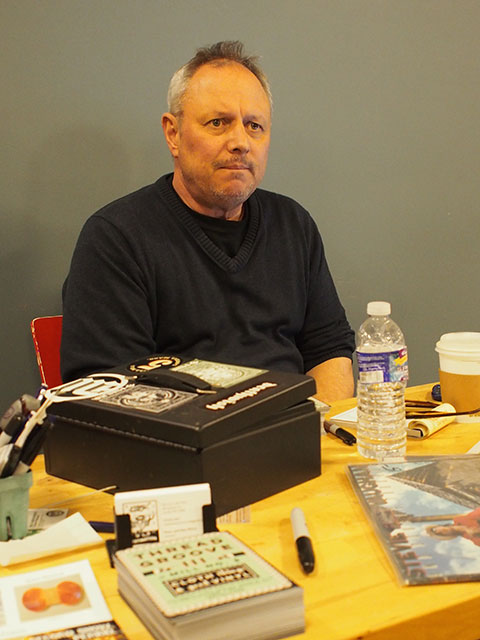

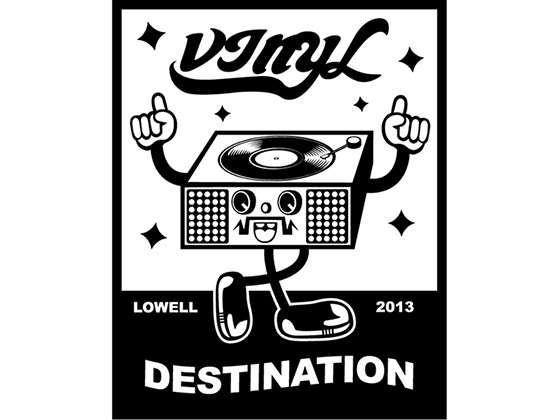
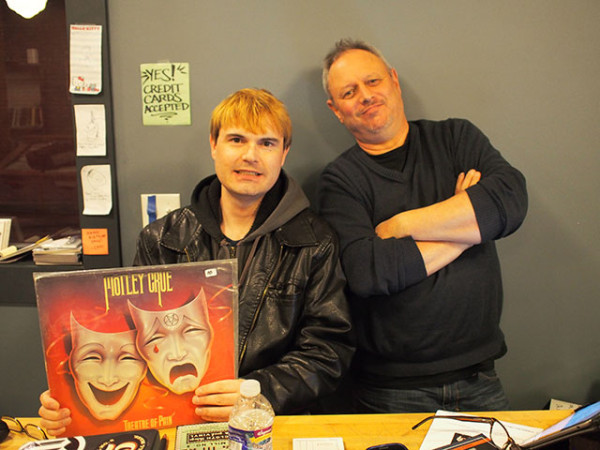
Leave a Reply